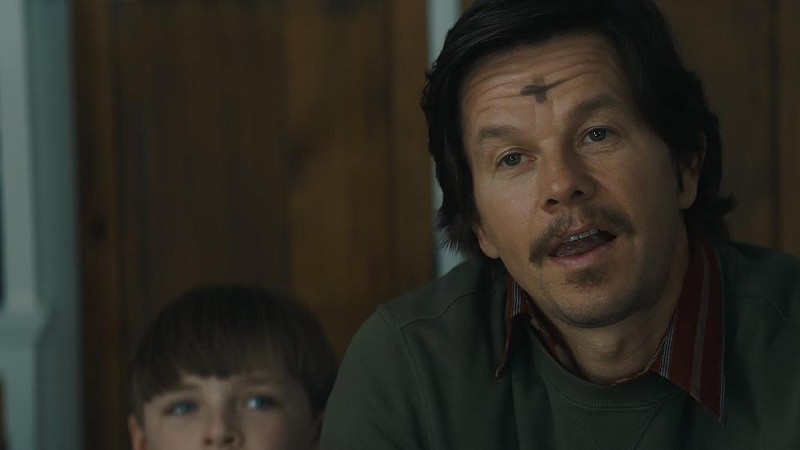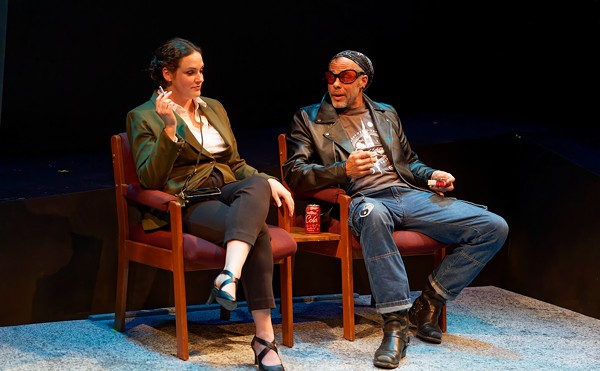
Courtesy photo
Mark Wahlberg in Father Stu, a film as rife with contradictions as the Church itself.
Google “Mark Wahlberg Catholic,” and before you type out the third letter, “Mark Wahlberg Calvin Klein” delightfully autocompletes. That the actor’s faith is still outshined by the 1992 underwear campaign that transformed him from rapper “Marky Mark” to fashion icon is perhaps of no surprise. After all, this is the guy whose breakout film role was playing porn star Dirk Diggler in Paul Thomas Anderson’s 1997 opus Boogie Nights. Wahlberg is the high-school dropout who for decades has epitomized the blue-collar American Adonis — from a philosophizing firefighter in I Heart Huckabees (2004) to a working-class boxing contender in The Fighter (2010).
More surprising for some may be that Wahlberg’s latest film — Father Stu, based on the true story of Stuart Long, a priest diagnosed with a muscular degenerative disease — is a natural choice for the actor. Written and directed by Rosalind Ross and funded in part by Mel Gibson, this unlikely tearjerker with a reverent twist has, despite tepid box office returns, drew viewers to theaters in droves over Easter, especially in highly Catholic cities. And the film’s odd appeal makes sense. Imagine if Dirk Diggler was 20 years older, and instead of heading to Hollywood from the South Bay, trucks out from rural Montana as a welterweight past his prime. Imagine if, instead of finding fame in X-rated movies, he converts to Catholicism in hopes of impressing a devout Hispanic woman (who, according to his supermarket coworker, is a certified “dime piece”). Imagine if, rather than cavorting with a mishmash of ’70s centerfolds and wannabe film stars, his makeshift family was comprised of the working-class immigrants and seminarians at a local Catholic church.
Still with me? The wildest part about Father Stu is that, at some level, it’s about the same thing as PTA’s masterpiece: a desultory white guy too charismatic for his own good, too unrefined for a typical nine-to-five, seeks, and finds, validation in a world wildly different from his own. But unlike Dirk, Wahlberg’s Stu is redeemed rather than demoralized, through the gradual realization that drinking and brawling his days away might not be the best way to get the girl (or stay out of jail). “Life’s going to give you a gut full of reasons to be angry, kid. You only need one to be grateful,” says a stranger concerned for Stu’s standing appointment at the local bar. “That’s the most fucked ratio since the number of marshmallows in Lucky Charms,” is Stu’s response, characteristic of the droll profanity that laces much of his speech.
Witnessing Stu’s sputtering spiritual awakening can be very entertaining — not least for the heathens among us. Encouraged by girlfriend Carmen (Teresa de Ruiz), Stu is baptized, teaches Sunday school and, following a near-death experience after a motorcycle crash, realizes he is called to reject a life of profligacy and become a priest. The film’s wry, Johnny Cash-style approach to sin and salvation proves a refreshing departure from both movie culture that paints believers as morons and the Christian media machine that relies on little but cringey platitudes.
That this Mel Gibson enterprise can be not only enjoyable, but moving, is as undeniable as it is uncomfortable to admit. A known sexist, Trumpy anti-Semite, Gibson is nevertheless bracingly convincing as Stu’s vitriolic father — perhaps even more so given that he plays a character not all that different from himself.
And here it’s imperative to emphasize that, while this movie is quite good at what it’s doing, what it is actually doing isn’t always — or even usually — that good. Stu is ostensibly saved through his faith and steely endurance of great physical suffering, suggesting that manning up and kneeling down are one and the same. But along these same lines, the secular world is conflated with emasculating depravity: A gay booking agent pressures Stu to give him head, a trans sex worker solicits Stu’s attention outside a ramshackle motel. Stu takes advantage of Carmen’s bottomless reserve of patience, only to brusquely jilt her for the priesthood.
In so many ways Father Stu is as rife with contradictions as the Church itself. On the one hand, Stu’s evolution from screwball narcissist to suffering saint follows a traditional “great man narrative” based on the idea that, with an iron will and refusal to take no for an answer, any person (read: man) can be “great” and exceed society’s expectations. On the other, Stu’s ascension to priesthood is only made possible by the extended kinship network he’s established with fellow seminarians and Los Angeles parishioners; when the diocese refuses to ordain him for what can only be called brutally ableist rationale, his community rallies to change its mind. In that respect, Father Stu seems more to indict the Church as a corrupt, hierarchical institution than champion it as sanctuary; so, too, is Stu rewarded for relying on others more so than defying the odds on his own.
“Blessed are the meek, for they shall inherit the earth,” claim the beatitudes that so many Catholics and Christians are raised on. When honoring the spirit of this credo, Father Stu seems to unwittingly advance a philosophy utterly at odds with what has become of much of American Christianity today. But when it kowtows to individualism and hypermasculine pride, no amount of holy water can wash away the stain.
Father Stu | Rated: R | Run-time: 124 minutes
- Sign up for our weekly newsletters to get the latest on the news, things to do and places to eat delivered right to your inbox.
- Follow us on Facebook, Twitter, Instagram, Reddit, and Google News.






